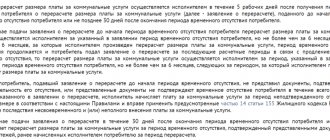Not all citizens manage to pay utility bills accurately. There are good reasons for this. However, if payments are delayed for more than 1-3-6 months, penalties may be charged and hot water, gas, and electricity may be turned off. And also through the court, the housing management organization collects the debt. And then the bailiffs will seize money and property. In some cases, the debtor may even be evicted from the apartment.
Read about all the consequences of having debt and how to avoid sanctions further in the article. If you have any questions, write in the comments
Legislation
The obligation to make monthly payments for housing and communal services is fixed in Article 155 of the Housing Code of the Russian Federation dated December 29, 2004 No. 188-FZ. According to the law, the owner must transfer funds to the management company’s account no later than 10 days after the end of the month following the billing period.
Payment may be made later if the condition is specified in the agreement between the service provider and the apartment building. The decision to postpone the repayment of debt for housing and communal services can be made at a general meeting of residents.
Attention! According to Art. 155 of the Housing Code of the Russian Federation, payment after the specified period is considered a violation of the agreement between the tenant and the management organization. But liability for non-payment occurs if contributions are delayed by 31 days or more.
Joint and several liability for utility debts
How to collect debt from citizens living with the owner or responsible tenant under a rental or social tenancy agreement? If it is impossible for the tenant (owner) to pay for utilities, the plaintiff (representative of the resource supply organization) has the right to collect the debt from any of the legally capable persons living with him. This is called joint liability.
Liability is provided for all persons if:
- the apartment is owned. The owner cannot or does not want to voluntarily repay the debt with his own funds. The law obliges the debt to be repaid by other capable family members living with the owner (spouse, children, parents, other persons occupying the premises with the consent of the owner) Art. 31 Housing Code of the Russian Federation.
- the apartment is in shared ownership. The obligation to pay rests with each owner individually. This is done by separating personal accounts with the conclusion of maintenance and repair agreements for each owner.
- residential premises are occupied by persons under a rental agreement. Members of the tenant's family are subject to similar obligations to pay for the use of services, that is, joint and several liability under the terms of the rental agreement. Persons living together with the tenant must be indicated when concluding the contract (Article 69 of the Housing Code of the Russian Federation).
List of mandatory payments
The management company can sue for non-payment of utilities if the contract is not observed for 3 months or more.
When calculating the payer's debts, contributions for mandatory housing and communal services are taken into account:
- Heating.
- Water supply.
- Drainage.
- Electricity.
- Garbage removal.
Internet and television are not included in the list of required services. If debt repayment is refused, providers limit access to the tariff. Other housing and communal services providers also go to court if the debt on receipts exceeds 10 thousand rubles.
From the video you will learn what will happen if you do not pay for housing and communal services:
Sale of the debtor's property
Occurs when it is impossible to repay the debt from a regular source of income. In this case, all of the debtor’s property is transferred to the bankruptcy estate except for that property that is not subject to collection. From the moment an individual is declared bankrupt, all rights to dispose of the property included in the bankruptcy estate are transferred to the financial manager. The debtor himself loses this right. The financial manager acts on his behalf.
The financial manager makes an inventory and assessment of the debtor's property, followed by submission to the court of regulations on the procedure, conditions and timing of its sale, and on establishing the starting price for its sale. The debtor's property is sold at auction. Property included in the bankruptcy estate, but not sold by the financial manager, is returned to the debtor.
All claims of creditors after the sale of the debtor’s property are lined up in a queue consisting of 4 levels of priority. Debt on utility bills is satisfied in the third priority, which includes demands for payment of debt for residential premises and utilities, contributions for major repairs of common property in the apartment building.
After completing settlements with creditors, the bankrupt citizen is released from further fulfillment of their claims.
Now you know what methods and measures you can use to influence debtors to pay utility bills in order to collect their debts.
Consequences of non-payment of utilities
Rent debt for 90 days or more leads to negative consequences for the apartment owner.
Homeowners' associations and management companies, in order to return cash for housing and communal services provided, apply the following types of penalties:
- Warning.
- Accrual of fines and penalties.
- Repeated warning.
- Shutdown (full or partial).
- Forced collection of debt through court.
Expert opinion
Klimov Yaroslav
More than 12 years in real estate, higher legal education (Russian Academy of Justice)
Ask a Question
Measures to repay the debt are taken gradually, starting with a warning and ending with legal proceedings. If the owner does not intend to repay the rent debt, he faces the loss of his reputation and even property.
Warning from utilities
The first actions against a willful defaulter are preventive measures. Utility companies are not interested in immediately disconnecting a customer from service. But if his debt exceeds 10 thousand, the company suffers losses.
Reference! According to the law, the first penalty is written notification of the existence of a debt. The customer may receive a receipt with the amount due or a separate warning.
The notification is sent to the registered address of the property owner.
The message from utility services states:
- Amount of debt.
- Penalties and fines.
- Payment deadline.
- Consequences for the owner if he refuses to pay.
The warning is received within 20 days from the date of debt formation. According to Art. 155 of the Housing Code of the Russian Federation, the period after the expiration of a 31-day refusal to make payments to housing and communal services is taken into account. The homeowner may receive notice of the need to repay financial obligations 2 months after the debt was incurred.
If the property owner chooses to wait and not pay, the warning will be followed by another penalty - a fine.
Calculation of a fine
After 31 days of non-payment of the debt, penalties are applied to the owner. Clause 14 of Article 155 of the RF Housing Code states that the amount of recovery is 1/300 of the refinancing rate established by the Central Bank of the Russian Federation in relation to the amount of debt. As of May 25, 2021, the current refinancing rate is 7.75% per annum.
Fines for debtors who do not pay for 91 days or more increase to 1/130 of the refinancing rate. Penalties are accrued daily until obligations to the creditor are fulfilled. If a debt lasts more than 3 months, the amount of the fine does not increase.
Important! The calculation of the fine is regulated by law. Utilities cannot charge a customer more than 1/130 of the refinance rate based on the total amount owed to date. The accrual of fines in excess of the established norm may lead to a reverse claim of arbitrariness against the housing and communal services.
Before collection, the debtor receives a warning. In the absence of actions aimed at getting rid of debts, the housing and communal services provider again issues a warning.
Repeated notifications
Utilities do not disconnect customers from service until the second notice is ignored. It arrives 20 days after the end of the deposit period.
It will not be possible to avoid paying for a long time after receiving the second notification.
The document is the last warning, after which the debtor may lose the use of the service completely. What is stated in the repeated notice:
- The full amount of the debt, taking into account accrued penalties and fines.
- Repeated payment terms.
- Possible consequences if you ignore your obligations to repay the debt.
- Timing of initial service deactivation.
- Date of termination of the contract with housing and communal services.
Reference! The contract is considered terminated from the moment the apartment is completely disconnected from the supply of housing and communal services. By law, the management company is obliged to notify residents no later than 3 days before the planned cutoff of rent.
Utilities do not have the right to terminate the contract without written notice. For this, they face a lawsuit from residents who may complain about violation of the law.
Disconnection from the service
Ignoring all warnings and refusing to repay the debt threatens the owner with utility service disconnection. Large rent debt can speed up the process.
If the company has received less than 50 thousand rubles, notifications about possible restrictions on the service may arrive earlier than 3 months after the refusal to make payments for the apartment.
Renewal of the contract: features
Once the supply of utility services is cut off, the property owner will not be able to simply pay the debt in order to use the amenities again.
To re-enter into a contract, the client must:
- Pay the debt, including all penalties and fines.
- Bring receipts confirming the fact of transfer of funds to the management company.
- Write applications for renewal of the contract with the HOA or management organization.
Expert opinion
Klimov Yaroslav
More than 12 years in real estate, higher legal education (Russian Academy of Justice)
Ask a Question
Resumption of service is possible after 3 working days from the date of registration of the application at the utility office. Sometimes the process drags on for 10 days or more if the payer lives more than 50 km from the utility branch, or all employees are busy.
Transfer to court
If the owner does not pay debts after notices and service restrictions, utility services file a claim in court.
In relation to persistent defaulters, the court may take various penalties:
- Seizure of accounts and property.
- Ban on travel outside Russia.
- Temporary revocation of a driver's license.
- Confiscation of property, including property.
- Eviction of the debtor and his family from housing.
The latter penalty is applicable only to citizens living under a social tenancy agreement. They are most at risk of losing their place of residence if they have been in debt for 6 months or more. A municipal apartment can be taken away after 7 months of late payments if the court rules in favor of the utility services.
Evicting tenants during a foreclosure process is not possible if the property owner has no other property suitable for occupancy. The company also does not have the right to take away the only housing from children, even if the owner has not paid for utilities for a long time.
Expert opinion
Klimov Yaroslav
More than 12 years in real estate, higher legal education (Russian Academy of Justice)
Ask a Question
When there is a large amount of debt for utility services, even companies that are late in payments for six months are sued. The debtor learns from the notice that his case is being considered in court. It is personally delivered by the postman against the signature of the property owner.
Written warnings
In parallel with the process of applying penalties, the debtor will receive letters from the management company warning about the possible transfer of the case to court. “The procedure for collecting debts for housing and communal services in general is no different from collecting any other debts. First, the management company or resource supplying organization sends claims demanding repayment of the debt that has arisen, along with calculations and deadlines. If the consumer does not repay the debt, the process of judicial collection of the debt for utilities will begin,” says Marat Amanliev, lawyer at the Trunov, Aivar and Partners bar association.
It is possible that a list of debtors will be posted at the entrance to make them “blush” in front of their neighbors. There is no legislative prohibition in this regard, as such. “The main thing here is to comply with the provisions on personal data. Do not indicate last names, first names, patronymics or whether the apartment belongs to a specific person. It is enough to indicate a list of apartment numbers and the corresponding debt. In this context, it is quite difficult to talk about violation of the law,” notes Marat Amanliev.
But most likely there will be no calls from the collector. According to the lawyer, today the practice of transferring debt to debt collectors has not yet been established, but he admits that in the future collection agencies will occupy this niche of working with debtors.
As Elena Dokuchaeva, president of the Sequoia Credit Consolidation collection agency, explained, most state-owned housing and communal services companies rarely turn to collection agencies because the market is still very young; the first cooperation with collectors was recorded here in 2010. In addition, with the average amount of debt for housing and communal services amounting to about 45 thousand rubles, labor costs for collection are high.
Legal methods of non-payment
Clients may not pay rent if:
- The service is provided inappropriately.
- They have already paid utility bills in the current period. Sometimes you receive repeated notifications demanding payment, which should be ignored if all debts are paid off.
- The supplier provided incorrect details. This happens when the management company changes. It is recommended that you contact the supplier's office to obtain a current invoice number or ask for a new payment notice.
- There was an overpayment for the previous period. Incorrect meter transfers or voluntary contributions above the norm can be the reason why homeowners have the right to legally not pay for several months.
It is the owner's duty to pay utilities. In the absence of legal reasons or benefits, the owner becomes a debtor if he does not pay for more than 31 days.
Privileges
It is not recommended to wait until the debt grows to 300 thousand: if you have problems repaying housing and communal services, it is better to contact the supplier directly. But some categories of citizens of the Russian Federation have the right not to pay utility bills completely or partially. These are beneficiaries who are allowed by the state to reduce the cost of maintaining their property by up to 100%.
According to Article 159 of the Housing Code of the Russian Federation, subsidies for utilities are available only to citizens of the Russian Federation.
Benefits are provided:
- veterans of the Great Patriotic War and military operations;
- disabled people of groups 1 and 2;
- Knights of the Order of Glory;
- Heroes of Russia and the USSR;
- labor veterans;
- some pensioners.
To receive a subsidy for housing and communal services, you should contact the territorial social protection authority with a passport and a document confirming your right to the benefit.
What you need to know
Citizens of the Russian Federation who do not have a debt to the management company can receive a subsidy for paying for utility services (Article 159 of the Housing Code of the Russian Federation).
If available, preferential categories have the right to receive reimbursement of housing costs if the payment is late due to a valid reason:
- Delay of wages.
- Loss of a job, inability to get a new job (if there are attempts).
- Inpatient treatment for the property owner or family members.
- The presence in the family of a minor child, a disabled person or an incompetent member of society.
Expert opinion
Klimov Yaroslav
More than 12 years in real estate, higher legal education (Russian Academy of Justice)
Ask a Question
The reason why the debt arose to public services requires documentary confirmation: a certificate from work, about the composition of the family, from the social service.
Forced eviction for utility debts
Can they be evicted from an apartment for a utility debt? Eviction for debt is a separate requirement of the statement of claim by representatives of the utility service. If, after the court decision comes into effect, the debtor continues to accumulate debt, does not comply with the requirements of the restructuring agreement, and the FSSP of the Russian Federation fails to collect anything from him, the time comes for this extreme measure - eviction.
Eviction procedure:
- written notification to the debtor about the possible application of eviction proceedings;
- filing a claim in court for the forced eviction of the debtor;
- After the court's decision, the person will be given 7 days to voluntarily evict, and then a compulsory order will be carried out.
Eviction from a privatized apartment
If a person has other suitable housing, he may be evicted for debt. This implies that the apartment will be seized and then sold at auction. That is, the debtor will be deprived of his property. The owner's right is protected here by Art. 446 Code of Civil Procedure of the Russian Federation. It says that in the absence of other suitable housing, foreclosure on the only housing is prohibited. And a person cannot be evicted to a hostel or social housing. Bailiffs have the right to seize, describe, and then sell at auction any property in the debtor’s apartment, and that which belongs to him personally.
An important point: if the debt is small, then they will not be able to repossess the apartment. Since the debt must be commensurate with the repossessed housing. There must be debts of up to a million rubles. So such cases are rare.
Eviction from a municipal apartment
The possibility of eviction from municipal housing is provided for in Art. 90 LC RF under the following circumstances:
- the debt for housing and communal services is more than six months, and the reason for lack of payment is not valid (loss of job, serious illness requiring treatment costs, loss of a close relative (funeral costs), compensation for material damage according to writs of execution);
- provision of other housing on social rent, meeting the requirements for living space and sanitary standards.
- The responsible tenant (with whom the contract is concluded), as well as members of his family, are subject to eviction.
As a result, the social rent agreement is terminated through the court and the person ends up on the street.
Eviction from the hostel
The rental agreement under which a citizen lives in a hostel is signed for a certain period (for the duration of work, study, service). The owner of the hostel can be an organization or municipality. The rights and obligations of the tenant under such an agreement coincide with the social tenancy agreement. Therefore, the landlord has the right to evict the debtor for debts that have arisen for more than six months (clause 1, part 4, article 83 of the Housing Code of the Russian Federation), without providing other housing. But after the court decision.
Actions of bailiffs in case of violation
If in a privatized apartment the debtor does not pay the obligations, or the tenant does not fulfill the requirements under the rental agreement, the bailiffs can recover funds from such clients to the service provider.
Actions of FSSP employees:
- Notice of seizure. Warning in the form of an SMS message from all banks with which the client opened accounts or cards.
- Collection in the amount of debt for utilities. Bailiffs can write off no more than 50% of the debtor’s income to the management organization.
- Seizure of property. If the client’s funds or income are insufficient, FSSP officers may seize the citizen’s property.
- Transfer of property as payment for a debt. For a debt of 100 thousand, the apartment will not be taken away, but an arrest will be imposed. Defaulters may lose their housing if they owe a debt of 1 million rubles or more.
Methods for collecting debt after a court decision has entered into force
Voluntary order
The debtor may be asked to pay the debt in full at one time, or to enter into an agreement on debt restructuring (usually concluded for a period of 6 months, but can be extended). This agreement is the most advantageous option, since it allows you to pay off the debt over a certain period, in equal shares, and not the entire amount at once. The restructuring agreement form is drawn up by utility companies based on the application you submit.
Sample application for debt restructuring for housing and communal services
To the head of Management Company "Zarya" Antonov A.S. from Yakimov S.T. residential address: Mirny, st. Soyuzov 31-2 tel. 34-37-21
Statement
I ask you to consider concluding an agreement with me on restructuring the debt for the use of services (specify the type of service: heating, sewerage, water supply) for residential premises owned by me, located at the address: Mirny, st. Unions 31-2.
As of March 1, 2021, the debt is 46,341 rubles. My last payment was made in October 2021.
The reason for the lack of payment is layoff from work, difficult financial situation.
Date__________ Signature_______________
Compulsory order - with the help of bailiffs
Collection by a bailiff can be made from funds from:
- working-age population: by sending a writ of execution to the place of work (main or part-time);
- pensioners: by seizing pensions and other income;
- disabled people: debt for housing and communal services can be recovered from a disability pension, except in cases where the person is deprived of legal capacity.
Important! The amount of monthly deductions from earnings or other income cannot be more than 50% of the total monthly income.
Other measures most often used by bailiffs:
- seizure of property (including money, securities, current accounts, property in the apartment);
- seizure of seized property and sale at auction;
- introduction of restrictions on leaving the Russian Federation;
- introduction of restrictions on registration actions with property.
See what the bailiff can take away, how to find out the debt from the bailiff by last name.
Debt repayment methods
The debtor has the right to deposit funds into the utility account in any convenient way:
- pay at the cashier. During a personal visit, the client can also change the terms of the contract or demand a recalculation;
- make a transfer at the bank. The period for crediting cash is up to 3 working days. Financial institutions charge a commission of 0–5% for services;
- pay online. Through online banks, wallets or payment services. This is the fastest way to pay for utilities, since funds are credited 1 minute after the transaction;
- through payment terminals. Receipt time is from 1 minute to 24 hours. It is recommended to keep receipts to prove the transfer of funds if a technical failure occurs.
Management companies do not impose requirements on debtors regarding the method of making payments to repay obligations. It is beneficial for HOAs and other organizations that the home owner pays off debts as quickly as possible, so they accept any receipts as confirmation that funds have been deposited.
You will learn what happens if you don’t pay utilities from the following video:
Judicial collection
Debt collection in court by decision of a judge. The management company will need to provide to the court as evidence the OSS protocol on the choice of method of managing the house and approval of the terms of the contract (Articles 161, 162 of the Housing Code of the Russian Federation), the calculation and amount of debt with data on the name of all types of work and services, the period of completion.
Often, management companies and bailiffs have to search for the debtor, since he may not even live at the specified registration address. For the entire period of searching for the debtor, enforcement proceedings in the case are suspended. The funds paid to the bailiff by the management company to search for the debtor (Clause 2 of Article 28 of the Law on Enforcement Proceedings) are then compensated by the debtor.
If any property of the debtor other than the premises belonging to him, then the Criminal Code has the right to petition the bailiff to foreclose on it. Property that may be subject to foreclosure includes:
- automobile;
- right of claim against other individuals or legal entities;
- bank accounts and deposits;
- companies that own any property.
If the owner himself does not live in the premises, but rents it out, then the debt is collected from the owner of the premises, and not from the tenant. If the owner-debtor dies, then his debts and the obligation to pay them are inherited by the legal successor.
Read about how to challenge administrative fines of the Criminal Code in this article.
Procedure for disconnecting services for non-payment
Housing and communal services services, after a written warning (3 days in advance), send an employee who blocks the supply of electricity, gas, and water to the debtor. Heating is a service that utility companies will not be able to turn off, even if there is a debt. The rule is stated in the Decree of the Government of the Russian Federation of August 8, 2012 No. 808. Restrictive actions can only be applied in the event of a temporary elimination of the malfunction. Complete isolation and termination of the contract cannot be carried out only at the initiative of the housing and communal services supplier.
If a client refuses to pay for utilities, he may lose his property. Fines for late payments are accrued starting from the 2nd month. The company may require the funds to be paid in a lump sum or allow the payment to be split over several periods.
Advice for debtors:
- Pay all overdue payments within 3 months. Once fines are assessed, the case will go to trial.
- Do not refuse cooperation if the supplier offers other tariffs and the opportunity to recalculate.
- Take advantage of programs that allow you to reduce debt, learn about possible benefits and co-financing programs.
- Respond to notices and notices received by mail from representatives of utility services.
- Contact the office in person if you have financial problems. Employees do not take harsh measures if the client voluntarily explains why he is delaying payment.
The debtor's cooperative actions may help him negotiate a possible deferment of payments and a reduction in penalties. This will reduce the amount of fines and preserve property ownership.
Restrictive actions
If the debtor manages to “turn a blind eye” to penalties and letters, and even calls, then the next method of influence definitely cannot be ignored: turning off electricity, water and gas in the apartment.
“For example, if we talk about gas, then in the literal sense of the word the pipe entering the stove can be cut and a plug welded on. After full payment of the debt, the consumer will have to apply to restore the gas supply and pay for the corresponding technical work. However, gas service workers may encounter a problem here. They cannot enter a person’s home. According to the Constitution of the Russian Federation, the home is inviolable; third parties can enter it in exceptional cases; law enforcement agencies have this right. Therefore, the issue of turning off gas in an apartment building is a big question,” says Marat Amanliev.
Another point is if we are not talking about an apartment, but about a house connected to the main gas pipeline. Here, according to Amanliev, everything is much simpler. The management company’s employees do not need to penetrate anywhere; it is enough to cut off the tie-in that goes from the common gas pipeline to the house. “With light, everything is also quite simple. Electricians come and cut off the wires in the electrical panel, which is publicly accessible on the landing or in the vestibule on the floor,” the lawyer argues.
In some regions, debtors are still disconnected from the sewerage system by installing plugs on the sewer pipe. But this is a controversial issue. On the one hand, the law does not prohibit this. But on the other hand, such a restriction can be interpreted as a violation of the requirements for the suitability of an apartment for habitation, which public utilities should not allow according to the rules for the provision of public services.
Of course, utility companies will not apply restrictive measures to everyone. “According to the law, such a drastic method can be resorted to after two months of missing payments, but in practice, companies try to use this measure of influence as a last resort when it is not possible to come to an agreement with the debtor,” notes Elena Dokuchaeva and adds that there is another important nuance - disconnection resources should not affect bona fide payers. Neighbors should not suffer from this, both in the house as a whole and in the apartment - if we are talking about a communal apartment.
By the way, they cannot turn off the heating in the apartment; in this regard, debtors are protected by the rules for organizing heat supply in Russia, approved by a decree of the Government of the Russian Federation in 2012.










